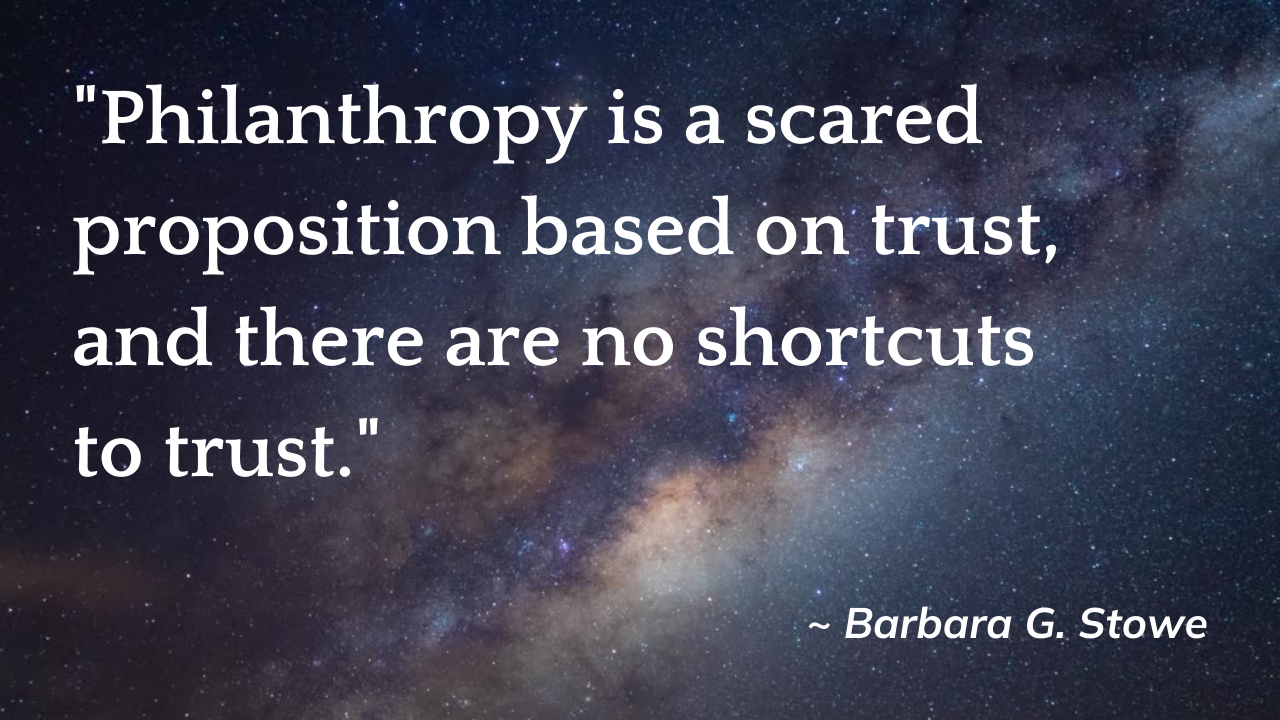Transfer of Trust

When working with donors to identify prospective donors who may wish to support your charity, an important part of relationship building is what I call "transfer of trust."
Kivi Leroux Miller talks about it in her book The Nonprofit Marketing Guide.
"Few people wake up and decide out of the blue to support a particular charity. It's much more likely that one of two scenarios will happen: the person will be referred to you by a trusted source, or the person will seek out an organization that can help her in some way."
The transfer of trust occurs when a donor makes an introduction of a friend, peer, or business associate to your nonprofit and explicitly or implicitly says,
"I believe in this."
"This is the charity where I choose to invest."
"I trust this nonprofit with my gifts and dreams and it is one of my (or THE) philanthropic priorities."
"I believe these people are doing amazing good works and I'm proud to be part of it."
"I know they use all their resources wisely - money, people, expertise."
"This charity exemplifies and fights for my values."
Donors usually support more than one organizations - several or even many - and they may tell their peers, "Yes! I support [nonprofit], too." But a transfer of trust is deeper than acknowledging basic support.
As a fundraiser, when you are working with individual donors (especially donors giving at the major or principal gift level) one effective way to meet and connect with new donors is to ask current donors personally introduce prospective supporters to you and your charity.
Donors may invite friends to your events or other nonprofit gatherings. But a transfer of trust occurs when a donor specifically invites a prospective donor to your organizations and shares why they support your cause and why they became involved.
These introductions are persuasive for the prospective donor when initiated by the donor who has expressed such trust in your nonprofit - and often in you.
How to make this transfer of trust happen organically? You can't. The trust is transferred when there is a genuine interest on the part of your donor.
As a fundraiser you must create and nurture authentic relationships with your donors. Not transactional donations. Not chasing "any gift."
And not ignoring donors once they have given their first (or successive) gifts, simply waiting for the next opportunity for solicitation.
Transfer of trust will happen when donors have faith in you and your charity and the change you are making - together - in the world.
Touch base with your donors regarding important impact milestones, steward them through reports or experiences, provide frequent and emotional communications (within the limits of what they have requested for contact). Calling your donor only when the need for a gift arises does not build trust. Let your donor share in the glory of the work your charity is accomplishing. Let her/him create the new future they dream of by being an important partner.
There is an adage that 5% of fundraising is asking for a gift, and 20% is nurturing the relationship and 75% is thanking and sharing the accomplishments and outcomes of the gift.
Transfer of trust between current and future donors is one of the most powerful alliances your nonprofit can experience. Your job as a fundraiser is to be as honest, welcoming, and trustworthy. Your nonprofit must also be transparent, ethical, and practice due diligence in finances and actions. When donors have confidence, they want to transfer their trust and encourage others to give.
First published Feb 25, 2014

